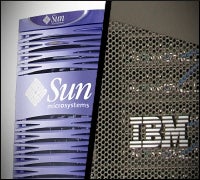 |
The on-again, off-again soap opera romance between Sun Microsystems and IBM is back on — but apparently one-sided, because IBM is reportedly not interested.
Negotiations for IBM (NYSE: IBM) to purchase Sun (NASDAQ: JAVA) for $7 billion seemed all but settled last week until they collapsed at the 11th hour. Since then, both companies have gone on their separate ways and have avoided discussing the issue at all.
But reports now state that Sun would like to reopen negotiations with IBM, if Big Blue made more effort to complete the deal, according to a Bloomberg report.
With neither company talking about the deal, getting a straight answer as to why the deal fell apart has been even harder. One rumor claims Sun executives squashed the deal because they were not satisfied with the compensation package being offered by IBM.
Another said Sun balked because there had been no promises from IBM that it would stick with the deal if serious antitrust challenges arose.
Sun CEO Jonathan Schwartz was reported to favor a deal and even shopped the company around, according to Intel Chief Paul Otellini, who made the comments internally to Intel employees, which promptly leaked to the press. But Bloomberg said Schwartz ultiamtely voted with the rest of Sun’s board to reject the offer because the price was too low and there was little certainty that the merger would close.
Cable business channel CNBC also reported that IBM has decided it is not interested in any further negotiations, despite Sun’s efforts to restart talks. One reason: IBM’s contacts within the U.S. Justice Department, Securities and Exchange Commission and the European Union have all advised the company that such a merger could be subject to an antitrust review lasting six to nine months, CNBC said.
And in IBM’s position, it doesn’t need that headache, said Charles King, principal analyst with Pund-IT.
“All in all, IBM is in a very solid position,” he told InternetNews.com. “Whereas I believe that some of Sun’s assets, particularly the software assets, could be extremely attractive to IBM, not getting them would not break the company.”
Complicating matters, an antitrust review of an IBM-Sun transaction seems likely given the changing regulatory climate, King said.
“Look at the degree of scrutiny that Microsoft received under the Clinton administration,” he said. “And then within weeks of Bush taking office in 2001, the attorney general was telling the states to sue for peace, basically. I think given the degree in increased regulations the Obama administration has exhibited, a review was almost inevitable.”
Then again, it’s unclear how damaging an antitrust investigation might have been.
“I don’t know if it would be enough to kill the deal,” King said. “It seems to me it would be part of the price of doing business, but I would not want to ascribe that to IBM.”
Sun’s prospects without IBM
In all the talk about the deal, Sun frequently has been portrayed as a crippled company near death — an outcome many suggest is now inevitable, following the lost opportunity for an acquisition by IBM.
But that’s an unfair depiction, King said.
“At the end of the day, Sun is still a $10 billion company,” he said. “They have a huge installed base. There are some potentially lucrative areas, including telco, financial services and the public sector.
“I could see them continue to perk along,” he added.


